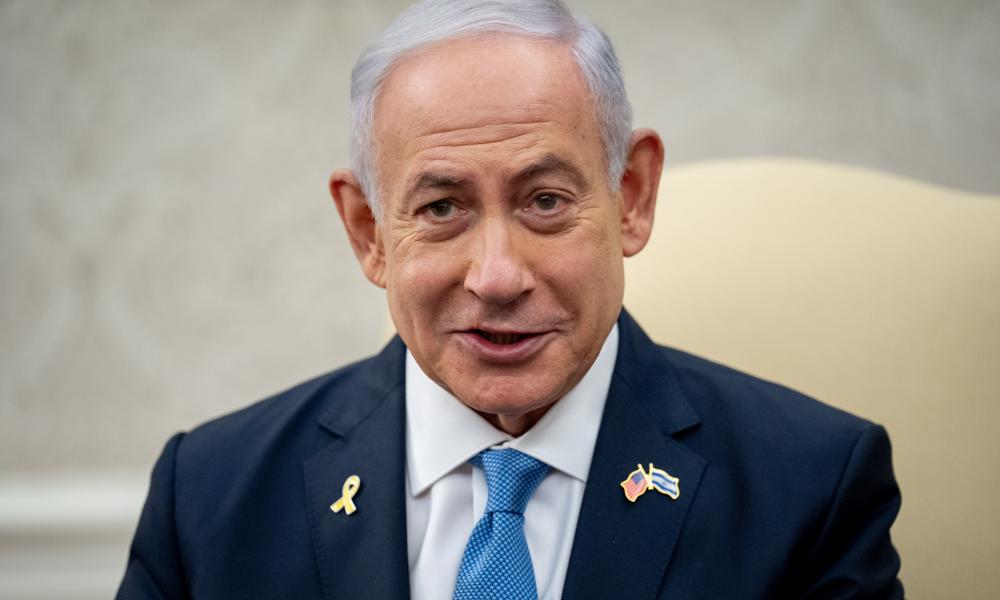
The Israeli prime minister, Benjamin Netanyahu, has for decades used set-piece speeches to the UN to denounce it. In 2017, he said it had been “the epicentre of global antisemitism” and there was “no limit to the UN’s absurdities when it comes to Israel”, but never have the tensions between him and the body he reviles reached such a pitch.
Since the 7 October massacre by Hamas, Israel has ignored four UN resolutions calling for a ceasefire in Gaza and has not just described the UN’s Palestinian refugee agency Unrwa as a terrorist state, but launched a campaign to bankrupt it. Arab envoys have walked out when the Israeli ambassador has started to speak.
Mahmoud Abbas, the president of the Palestinian Authority, now itself a near full member of the UN, told the general assembly in his speech on Thursday that Israel no longer deserved to be a member, since it flouted its resolutions.
It is the UN’s historic role in the birth of the state of Israel, alongside a state for Palestinians, with the partition resolution of November 1947 that makes Israel such a central and difficult issue for the organisation. Having blessed Israel’s creation, by 1975 the UN general assembly was passing a resolution saying Zionism was a form of racism and racial discrimination.
History is catching up with both sides. When the UN’s premier court, the international court of justice, in July found Israel’s extended occupation of the Palestinian territories discriminatory, the UN’s role in the birth of the state of Israel was the cornerstone of its wider judgment.
The UN general assembly has demanded Israel leave the occupied territories within a year, and that the general secretary, António Guterres, prepare a report on progress towards this goal within a month. This last high-level week at the UN has seen speech after speech by world leaders condemning Israel for defying international law, and so damaging the UN’s authority. Many have been crude, such as the Turkish president comparing Netanyahu to Hitler.
Israel has long called the UN human rights council the terrorist rights council, but the conflict between the UN and Israel has now become visceral. In his farewell speech in August, the outgoing Israeli ambassador to the UN, Gilad Erdan, said: “In this warped place, I hope one day you will also see the bias and perversion of morality here, and I pray that you will see the truth.”
Erdan’s often theatrical and passionate defence of his country won him few friends at the UN, but is passionately supported back home. Pew research published earlier this month found the proportion of those in Israel who had a favourable view of the UN in Israel fell from 31% – which was already relatively low – to 21% over the past year. The median among 35 countries was 58%.
Erdan’s successor, Danny Danon, has this week attacked the UN over its agency for Palestinian refugees. “Peace is hard to come by while the UN remains loth to come to terms with the sinister reality that one of its agencies, Unrwa in Gaza, has been overrun by Hamas terrorists,” he wrote in an article for Fox News. “For that reason, and for the sake of peace for Israelis and for Gazans, Unrwa must be disbanded.”
Following a meeting on the sidelines of the UN in support of Unrwa, the Jordanian foreign minister, Ayman Safadi, said it was intolerable that a UN agency was being described as terrorist, and subject to a political assassination campaign. “The attack was undermining the whole UN system,” he said.
The Unrwa chief, Philippe Lazzarini, said behind the Israeli attack was an attempt to strip Palestinians of refugee status, and even their right to self-determination. But in the short term what will be disturbing Netanyahu, himself a former Israeli envoy to the UN, is not the hostility of UN mainstream opinion. He has entered the lion’s den many times before and ultimately emerged unscathed.
Related: Lebanon ceasefire hopes fade as Netanyahu issues contradictory statements
What will be exercising Netanyahu is the evident tension between him and the US administration over his behaviour before his eventual rejection of the US plan for a 21-day ceasefire in Lebanon. The deal was supposed to be the day diplomacy fought back, but by Thursday it looked like it was the day it fell over. The US clearly feels he reneged on a deal, and not for the first time since 7 October.
One senior European diplomat, long opposed to US strategy, was incredulous that the US had not sought clearer guarantees from Netanyahu before going public with the 21-day ceasefire plan.
Reflecting US anger, the US national security spokesperson John Kirby said pointedly: “That statement we worked on last night wasn’t just drawn up in a vacuum. It was done after careful consultation, not only with the countries that signed on to it, but Israel itself.”
The French president, Emmanuel Macron, who had been at the heart of the talks in New York, said the proposal had been “prepared, negotiated with the [Israeli] prime minister and his teams, both by the Americans and by ourselves” .
But it will not be the first time the west has thought Netanyahu is making a strategic mistake, but then proved unable or unwilling to force him to rethink.
EMEA Tribune is not involved in this news article, it is taken from our partners and or from the News Agencies. Copyright and Credit go to the News Agencies, email news@emeatribune.com Follow our WhatsApp verified Channel



